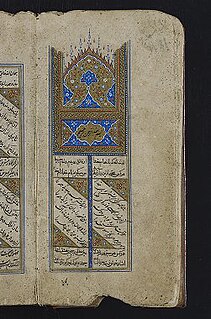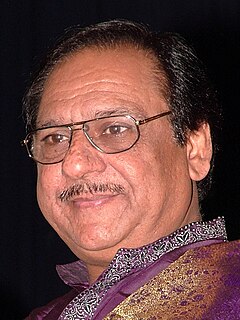The Music of Pakistan includes diverse elements ranging from music from various parts of South Asia as well as Central Asian, Middle Eastern, and modern-day Western popular music influences. With these multiple influences, a distinctive Pakistani music has emerged.

Noor Jehan, also known by her honorific title Malika-e-Tarannum, was a Punjabi playback singer and actress who worked first in India and then in the cinema of Pakistan. Her career spanned more than six decades. Considered to be one of the greatest and most influential singers in Indian subcontinent, she was given the honorific title of Malika-e-Tarannum in Pakistan. She had a command of Hindustani classical music as well as other music genres.

The ghazal is a form of amatory poem or ode, originating in Arabic poetry. A ghazal may be understood as a poetic expression of both the pain of loss or separation and the beauty of love in spite of that pain.

Jagjit Singh was an Indian composer, singer and musician. He composed and sang in numerous languages and is credited for the revival and popularity of ghazal, an Indian classical art form, by choosing poetry that was relevant to the masses and composing them in a way that laid more emphasis on the meaning of words and melody evoked by them. In terms of Indian classical music, his style of composing and gayaki (singing) is considered as Bol-pradhan, one that lays emphasis on words. He highlighted this in his music for films such as Prem Geet (1981), Arth (1982), and Saath Saath (1982), and TV serials Mirza Ghalib (1988) and Kahkashan (1991). Singh is considered to be the most successful ghazal singer and composer of all time in terms of critical acclaim and commercial success. With a career spanning five decades and many albums, the range and breadth of his work has been regarded as genre-defining.

Ustad Ghulam Ali is a Pakistani ghazal singer of the Patiala Gharana. He has also been a prominent playback singer in Bollywood. Ghulam Ali was a disciple of Bade Ghulam Ali Khan. Ali was also trained by Bade Ghulam Ali's younger brothers – Barkat Ali Khan and Mubarak Ali Khan.

Ustad Bade Ghulam Ali Khan was an Indian Hindustani classical vocalist, from the Patiala gharana.

Rahat Fateh Ali Khan is a Pakistani Singer, primarily of Qawwali, a form of Sufi devotional music. Khan is one of the biggest and highest paid singers in Pakistan. He is the nephew of Nusrat Fateh Ali Khan, son of Farrukh Fateh Ali Khan and grandson of Qawwali singer Fateh Ali Khan. In addition to Qawwali, he also performs ghazals and other light music. He is also popular as a playback singer in Hindi cinema and the Pakistan film industry.

Ustad Bade Fateh Ali Khan was among the foremost Khyal vocalists in Pakistan, and a leading exponent of the Patiala Gharana tradition of music. He was the younger of the legendary singing duo Amanat Ali and Fateh Ali, who enjoyed immense prestige and success across the subcontinent and beyond until the sudden and unexpected death of Ustad Amanat Ali Khan in 1974. For his contributions to classical music, Fateh Ali was honoured with the highest national literary award of Pakistan – the Pride of Performance – by the President of Pakistan in 1969.

Rahul Deshpande is an Indian classical music singer. He is the recipient of the 68th national award of the best playback singer for Me Vasantrao. He is the grandson of Vasantrao Deshpande
Paṅjāb Gharānā, is a style and technique of Tabla playing that originated in the Punjab region of the Indian subcontinent, now split between present-day Pakistan and India. The Punjab Gharana is considered one of the six main styles of Tabla, the others being Delhi, Ajrada, Banares, Lucknow, and Farrukhabad. The repertoire of the Punjab Gharana is heavily influenced by the Pakhawaj.

The Patiala gharana is one of the vocal gharanas of Hindustani classical music, named after the city of Patiala in Punjab, India where it was established. The gharana was founded in the mid to late 19th century by Mian Kallu, a sārangi player of the Jaipur durbar. He received his musical training from the last Mughal king Bahadur Shah Zafar’s court musician Qutub Bakhsh ‘Tanras’ Khan and went on to become the court musician to the Maharaja of Patiala. Eventually, the mantle was passed on to his son, ‘General’ Ali Baksh Khan and his close friend ‘Colonel’ Fateh Ali Khan, both of whom became court musicians in the court of Maharaja Rajinder Singh. The titles of 'general' and 'colonel' of music were bestowed upon them by the Victor Alexander Bruce, the 9th Earl of Elgin, after the duo had enthralled him with their performance. Their pairing was popularly referred to as 'Ali-a-Fattu ki Jodi.'
Sham Chaurasi Gharana is a vocal gharana in Hindustani classical music known for the singing of vocal duets. It is also known as the cradle of drupad. It is one of the four singing gharanas of Punjab; the other three are: Patiala, Talwandi and Kapurthala. It is most notably represented in modern times by the brothers Nazakat and Salamat Ali Khan.

Javed Ali is an Indian playback singer who predominantly sings in Hindi. He has also sung in various Indian languages including Bengali, Kannada, Malayalam, Gujarati, Marathi, Odia, Tamil, Telugu and Urdu.
Shaukat Ali, also known as Shaukat Ali Khan, was a Pakistani folk singer.
Abdul Sattar Khan, popularly known as Ustad Tari Khan, is a Pakistani tabla player and vocalist. Tari Khan hails from the Punjab gharana and is the student of Ustad Miyan Shaukat Hussain. He has been awarded with many accolades such as Taj Poshi, the Hazrat Amir Khusrow Award, as well as Pakistan's Pride of Performance Award in 2008. Tari Khan belongs to the tabla playing gharana called the Punjab gharana. Today, he is acknowledged as one of the foremost Tabla players of all time by musicians all over the world.

Badar uz Zaman is a classical musician of Pakistan. He contributes to Pakistani Classical Music by promoting and re-interpreting compositions of the sub-continent's Muslim composers. Zaman performs with his brother, Ustad Qamar-uz-Zaman, carrying forward the Pakistan's own "Kasur Gharana" traditions of the art of Khayal music. Classical singers typically represent Indian Gharanas of Music.
Ustad Barkat Ali Khan was a Pakistani classical singer, younger brother of Bade Ghulam Ali Khan and elder brother of Mubarak Ali Khan, and belonged to the Patiala gharana of music.

Adithya Srinivasan is an Indian singer. He is best known for his award winning ghazals, and international singles in classical, pop, and world music genres. His notable performances include sharing stage space with Hariharan and opening for Ghulam Ali.
Ali Aziz Sethi is a Pakistani singer, songwriter, composer, and author. Sethi rose to prominence with his debut novel, The Wish Maker (2009). In 2012, Sethi began focusing on his musical career and made his film debut as a singer in Mira Nair's 2012 film, The Reluctant Fundamentalist, with the song Dil Jalane Ki Baat Karte Ho. In recent years, Sethi has released numerous cover singles and has appeared on several seasons of Coke Studio Pakistan. Sethi began releasing original music in 2019 and has collaborated with Grammy-winning producer Noah Georgeson. His most recent single for Coke Studio – Pasoori (2022) – became the first Pakistani song to feature on Spotify's "Viral 50 - Global" chart, eventually climbing to the top of the chart in May 2022. With 436 million views on YouTube as of November 11, 2022, Pasoori is currently the most watched Coke Studio music video of all time.
Ghulam Abbas is a Pakistani radio, television, and film singer. He is known for his 'ghazals', 'geets', and playback singing for Urdu and Punjabi movies. He has won 4 Nigar Awards as a playback singer and received Tamgha-i-Imtiaz by the President of Pakistan in 2011.










